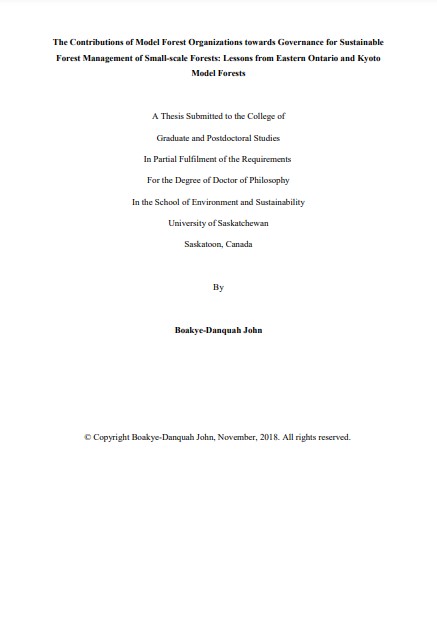The Contributions of Model Forest Organizations towards Governance for Sustainable Forest Management of Small-scale Forests: Lessons from Eastern Ontario and Kyoto Model Forests
Bosque Modelo:
Kyoto
Temática:
Gestión forestal
Tipo de documento:
Tesis de postgrado
Resumen
The Model Forest (MF) concept emerged in Canada in the early 1990’s to promote partnership arrangements for the sustainable governance of forest landscapes. Since then, the concept has grown internationally, attracting interests from both policy-makers and researchers. Internationally, MF arrangements provide a platform not only for fostering multilevel governance arrangements but also to act as bridging organizations that facilitate the interaction of multiple actors from the state, market and community to achieve sustainability within specific socio-ecological landscapes. For instance, in some jurisdictions, the role of MFs in facilitating partnership arrangements between local communities and markets described as private-social partnership arrangements to enhance the sustainable management of forests has been noted. However, our understanding of the effectiveness of MFs in promoting private-social partnership arrangements for the sustainable management of smallscale forests across different institutional settings is less well known. Hence, this thesis examines the effectiveness of Model Forests (MF) as bridging organizations that facilitate the participation of small-scale foresters in private-social partnerships to achieve sustainability in forest landscapes. Consequently, two MF organizations including the Kyoto Model Forest Association (KMFA) in Japan, and the Eastern Ontario Model Forest (EOMF) in Canada, both with a similar focus on small-scale foresters were selected as case studies. The objectives of the research were: (a) assess the effectiveness of MFs as bridging organizations in convening private-social partnership arrangements to improve local socio-ecological sustainability; (b) assess the effectiveness of MFs as bridging organizations to improving the effective participation of local actors in private-social partnership arrangements; (c) examine how MFs can improve local dimensions of well-being linked to ecosystem functioning; and (d) consider the implications of private-social partnerships in multi-level forest governance arrangements for the sustainable management of small-scale forests. Data was collected using a mixed-method approach involving document analysis, semi-structured and group interviews, a questionnaire survey, and field observations.
Información Bibliográfica
Autor:
Boakye-Danquah, J.
Año:
2018
País :
Japón
Páginas:
-
Idioma:
Ingles
Palabras claves
model forest, sustainability, e management of forests





